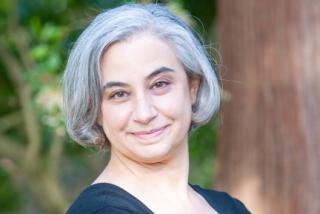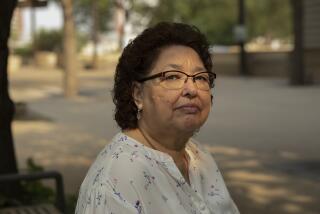Indian Mother’s Baby Reportedly Smuggled to Canada to Avoid Tribe
CYPRESS — A native Aleut Indian teen-ager who lives in Cypress has gone into hiding, and reportedly has smuggled her 5-month-old daughter to a Canadian family for adoption rather than surrender the child to the Indian tribe.
Bertram E. Hirsch, a New York attorney representing the tribe in its fight to place the baby with an Aleut family, said Jodi Argleben, 18, has given little Rebecca to a family in Vancouver, British Columbia, and has gone into hiding to avoid the ensuing tumult.
Ernest Argleben of Cypress, a non-Indian who adopted Jodi from her tribal hometown in Alaska when she was 3, said she has been in hiding for about 2 1/2 weeks. He said he does not know the location of the baby or her mother, or whether the baby has been given to a Canadian family. But he said he knows the infant is all right. His wife, Judi Argleben, has also gone into hiding, Argleben said.
“We don’t trust the Indians,” Argleben said. “We think they’ll try to get the baby. Jodi doesn’t want that. She should have the right to make any decision concerning herself and her baby.”
Hirsch said that British Columbia’s Ministry of Social Services and Housing, which oversees adoptions in the province, told him that a Vancouver couple has the baby and applied on Oct. 2 to adopt her. He would not reveal the family’s name.
He said he suspects the prospective parents are unaware of the struggle over Rebecca and that the news will “come as a shock.” Hirsch said Jodi Argleben made contact with the Canadian couple through a lawyer who “has a reputation as an international baby broker.”
Contacted by a reporter, a Ministry spokesman said he could neither confirm nor deny that a Canadian family had applied to adopt the baby.
At a hearing scheduled today before Orange County Superior Court Judge Robert J. Polis, attorneys in the case will discuss what to do next, Hirsch said. Harold La Flamme, Rebecca’s court-appointed attorney, requested the hearing when he could not find Jodi Argleben or the baby, Hirsch said.
The disappearance of Argleben, a single mother, and her child constitutes a radical turn in her battle against the tribe that wishes to rear her baby. The mother has wanted to give Rebecca up for adoption since the infant’s birth, but the tribe interceded, contending that the baby should be placed with an Aleut family.
The Aleuts, most of whom live on Kodiak Island, about 350 miles southwest of Anchorage, cite the 1978 Indian Child Welfare Act, which says an Indian child who is put up for adoption should be kept within the tribe unless there is reason to do otherwise.
Jodi Argleben visited her hometown of Akhiok, Alaska, in September when she was contemplating giving Rebecca to a tribal family there. But she told The Times last month that she did not want Rebecca reared in such a poor village and that she was hoping to find something better for her.
Stanford E. Lerch, a Phoenix attorney who is an expert on Indian family and child law, said the interests of Indian tribes in preserving their culture are more important than a mother’s desire to govern her baby’s life.
“The tribe does have a vested interest in protecting its background and having the opportunity to teach a child its lore and culture, which they could lose over time if more and more Indian children are raised by non-Indian families,” Lerch said. “It’s very important to them.
“Sometimes when a law is enforced, it seems harsh and a few people are hurt, but that doesn’t mean the law is bad.”
Hirsch said the Ministry of Social Services and Housing has filed papers in court in British Columbia asking a judge to guide the agency in assessing its role in the dispute. He said the social services agency does not know whether it must investigate the circumstances of the baby’s arrival in Canada, or if it is obliged to enforce U.S. law and prevent the adoption.
New Jersey attorney Gary N. Skoloff, chairman-elect of the American Bar Assn.’s family law section, said he believes that under terms of the Hague Convention, a Canadian judge would have to surrender jurisdiction in the matter and order the baby returned to Orange County.
Skoloff, who gained international fame representing the biological parents of Baby M in their successful custody fight against the baby’s surrogate mother, said that by signing the Hague treaty, the United States and Canada agreed that they would not allow their countries to be used as havens for parents who secrete their children to avoid custody disputes.
Hirsch said he wouldn’t be surprised if the State Department stepped into the battle over Jodi Argleben’s daughter.
More to Read
Sign up for Essential California
The most important California stories and recommendations in your inbox every morning.
You may occasionally receive promotional content from the Los Angeles Times.










